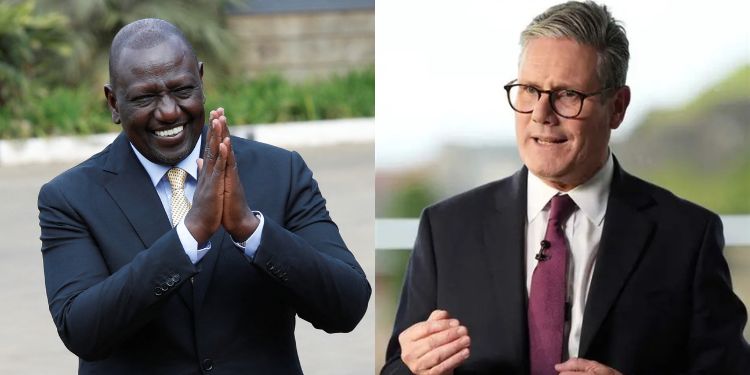When military training goes wrong, the consequences can be devastating — not only for the environment but also for local communities who depend on the land. This is exactly what happened in Kenya when a training exercise conducted by British troops ignited a massive forest fire. The fire destroyed large swathes of land, damaged ecosystems, and left communities grappling with the aftermath.
- The Background: British Troops in Kenya
- The Incident: How the Forest Fire Started
- The Scale of the Damage
- The Legal Battle for Compensation
- Reactions to the Compensation Deal
- Military Accountability and International Law
- Colonial Shadows: Why the Case Resonates
- The Environmental Lessons
- Public Opinion: Voices from Kenya and the UK
- Future of UK-Kenya Military Relations
- FAQs
- Conclusion
In a significant development, the United Kingdom has agreed to pay $4 million in compensation following legal battles and mounting pressure from environmentalists, local leaders, and human rights groups. The case has sparked important debates about colonial legacies, military accountability, and environmental justice in Africa.
This article explores the incident, the damage caused, the compensation deal, and its broader implications for international military agreements and environmental protection.
The Background: British Troops in Kenya
The United Kingdom has maintained a long-standing military presence in Kenya, a legacy of colonial ties.
British Army Training in Kenya
- Kenya is home to the British Army Training Unit Kenya (BATUK), where UK troops regularly conduct exercises.
- The arid and forested terrain is considered ideal for preparing soldiers for desert and jungle warfare.
- According to official agreements, the British Army’s presence is meant to be mutually beneficial, bringing in economic activity while strengthening security ties.
However, locals have often raised concerns about land disputes, environmental damage, and alleged abuses linked to the training exercises. The forest fire case became one of the most high-profile controversies in recent years.
The Incident: How the Forest Fire Started
In 2021, a military training exercise by UK troops at the Lolldaiga Conservancy in central Kenya went horribly wrong.
Details of the Fire
- The fire reportedly began when a flare used during training ignited dry grass.
- Strong winds and high temperatures quickly spread the flames across the conservancy.
- Witnesses described the fire as “uncontrollable” and “devastating,” engulfing thousands of acres within hours.
Local residents and environmental groups accused the British Army of negligence, arguing that the use of live munitions and flares during the dry season was reckless.
The Scale of the Damage
The Lolldaiga fire caused severe environmental and social damage.
Environmental Impact
- Over 12,000 acres of forest and grassland were destroyed.
- Habitats for elephants, leopards, and rare bird species were lost.
- Environmentalists warned that it would take decades for the ecosystem to recover.
Community Impact
- Smoke from the fire spread into nearby villages, causing respiratory illnesses.
- Farmers lost grazing land for their livestock, worsening economic hardship.
- Locals accused BATUK of failing to provide immediate medical and logistical assistance.
The disaster left a scar not only on the land but also on the relationship between Kenyan communities and the British military.
The Legal Battle for Compensation
After the fire, victims and advocacy groups pursued legal action against the UK.
Claims and Demands
- Villagers filed lawsuits claiming damages to health, land, and livelihoods.
- Kenyan activists argued that foreign troops should not be immune from accountability.
- Some campaigners linked the case to broader issues of colonial-era injustices, demanding that Britain acknowledge its historical and present-day impact.
The Settlement
In 2025, the UK government announced it would pay $4 million in compensation to victims of the fire.
- The funds will go to community development projects, healthcare support, and environmental restoration.
- Officials described the settlement as a “gesture of goodwill” but stopped short of admitting full liability.
For many Kenyans, the compensation was seen as a partial victory, though critics argue it does not go far enough to cover the long-term damages.
Reactions to the Compensation Deal
Kenyan Government
Kenya’s leaders welcomed the settlement but called for stricter oversight of foreign military exercises to prevent future incidents.
Local Communities
Residents expressed relief at receiving some form of justice but noted the payout per household may be limited once divided. Some demanded direct financial compensation rather than projects.
UK Officials
British authorities maintained that BATUK plays a crucial role in regional security and training, emphasizing that the incident was accidental.
Environmentalists
Conservation groups argue that money alone cannot restore the destroyed ecosystem. They called for long-term commitments to reforestation and wildlife protection.
Military Accountability and International Law
The Kenya fire raises wider questions about military accountability abroad.
Immunity vs. Responsibility
- Under international agreements, foreign troops often enjoy legal immunity, making it hard for victims to seek justice.
- The Lolldaiga case shows that public pressure and legal activism can push powerful nations to act.
Global Precedents
- In Iraq and Afghanistan, local communities have also filed claims for damages linked to foreign troops.
- The Kenya settlement may set a precedent for similar cases in Africa and beyond.
Colonial Shadows: Why the Case Resonates
The UK’s military presence in Kenya cannot be separated from its colonial history.
Historical Context
- During the colonial era, British forces forcibly displaced communities from fertile lands.
- Environmental degradation and social inequality were legacies of colonial exploitation.
For many Kenyans, the fire symbolized a continuation of foreign exploitation, and the fight for compensation was not just about money but about dignity and recognition.
The Environmental Lessons
The incident highlights the urgent need to balance security cooperation with environmental protection.
Preventing Future Disasters
- Stronger environmental safeguards during training exercises.
- Seasonal restrictions on live-fire drills.
- Independent monitoring of military activities in conservancies.
Long-Term Restoration
Experts argue that reforestation, soil restoration, and wildlife rehabilitation must be central to any compensation plan.
Public Opinion: Voices from Kenya and the UK
Public reactions reflect the complexity of the issue.
- Kenyan Citizens: Many believe $4 million is insufficient given the damage, but they see it as an acknowledgment of wrongdoing.
- British Citizens: Some critics in the UK argue taxpayers should not foot the bill for overseas negligence. Others believe accountability is necessary for maintaining global credibility.
- Global Observers: Human rights groups worldwide hailed the settlement as a breakthrough for communities often ignored in such cases.
Future of UK-Kenya Military Relations
The fire and compensation deal may reshape the way Kenya and the UK engage militarily.
Possible Changes Ahead
- Stricter conditions in training agreements.
- Increased community involvement in oversight.
- Greater emphasis on environmental safeguards.
While the partnership remains strong, the incident has added pressure on both governments to ensure that military cooperation does not come at the cost of local lives and environments.
FAQs
What caused the Kenya forest fire involving UK troops?
The fire was sparked during a British military training exercise when a flare ignited dry grass.
How much compensation is the UK paying?
The UK agreed to pay $4 million for community support, healthcare, and environmental restoration.
Who will receive the compensation?
Funds will go toward affected communities through development projects and recovery efforts.
Why is this case significant?
It highlights issues of military accountability, environmental justice, and the legacies of colonialism.
Could similar incidents happen again?
Yes, unless stricter environmental safeguards and oversight are implemented in future military exercises.
Conclusion
The UK’s decision to pay $4 million in compensation after its troop training sparked a massive forest fire in Kenya marks a landmark case in international accountability. While the money will provide some relief, the environmental and social scars will take much longer to heal.
The incident is a reminder of the fragile balance between military cooperation and community rights, between security interests and environmental protection. For Kenya, it has reignited debates about sovereignty, justice, and colonial legacies. For the UK, it is a test of its willingness to accept responsibility abroad.
Ultimately, the fire serves as a cautionary tale: when powerful nations operate on foreign soil, accountability must travel with them.








